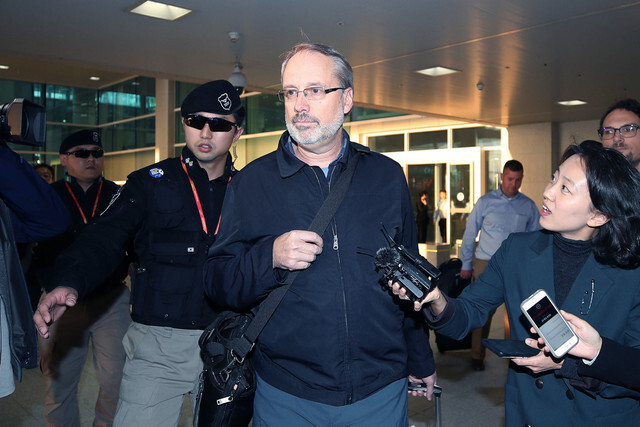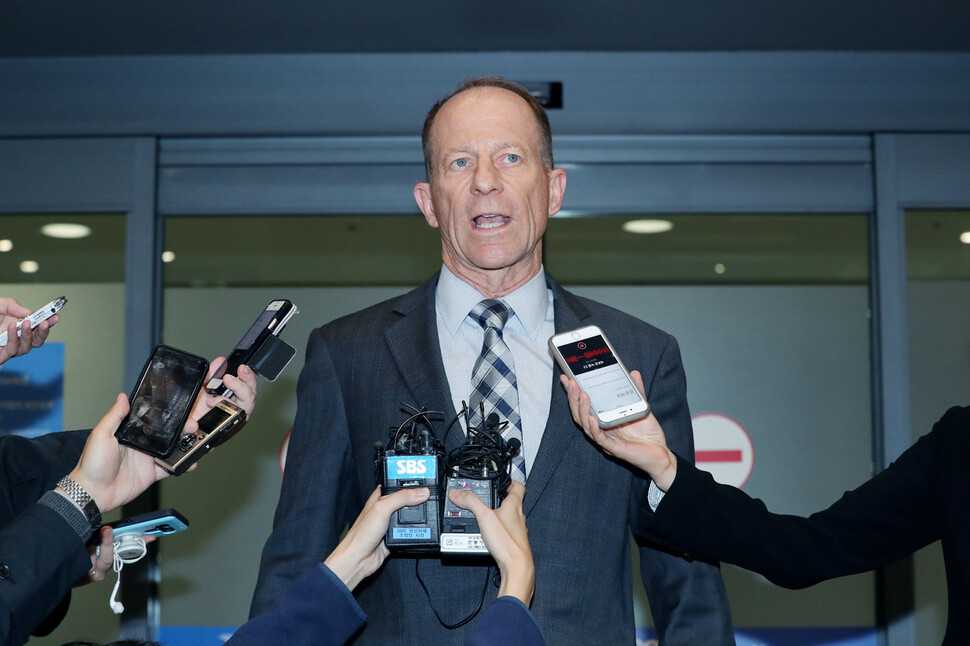hankyoreh
Links to other country sites 다른 나라 사이트 링크
US chief negotiator in SMA negotiations makes surprise Seoul visit

The US is continuing its multipronged campaign to force South Korea to make a massive increase in its financial contribution to the cost of stationing American troops in the country and to renew its GSOMIA intelligence-sharing agreement with Japan.
James DeHart, the chief American negotiator in defense cost-sharing talks with South Korea, paid an unexpected and unofficial visit to South Korea on Nov. 5. His visit is separate from the third round of negotiations for the two countries’ 11th Special Measures Agreement (SMA), which is slated to take place in Seoul before the end of November.
Along with an off-the-record dinner with Chung Eun-bo, head of the South Korean negotiating team, DeHart is planning to meet with members of the National Assembly, the press, and US Forces Korea (USFK).
There is little precedent for an American chief negotiator to visit South Korea separately from the talks in a bid to gauge local public opinion. With the US reportedly pushing South Korea to fork over US$5 billion a year, nearly six times its current contribution, there’s growing discontent in the Korean public. DeHart’s visit appears designed to personally assess trends in South Korea and to communicate the US’ position.

DeHart’s visit to South Korea overlaps with that of Assistant Secretary of State David R. Stilwell of the Bureau of East Asian and Pacific Affairs. Stilwell, who arrived in Seoul on Nov. 5, is also likely to communicate the American perspective on the cost-sharing contribution and on extending GSOMIA during meetings with South Korean officials.
On the morning of Nov. 6, Stilwell was scheduled to meet with Minister of Foreign Affairs Kang Kyung-wha and First Vice Foreign Minister Cho Se-young, followed by separate meetings with a senior official from the Blue House National Security Office and Chung Suk-hwan, chief of the Ministry of National Defense’s defense policy office.
Officials on the South Korean side appeared likely to explain Seoul’s efforts to improve ties with Japan, including an 11-minute conversation between South Korean President Moon Jae-in and Japanese Prime Minister Shinzo Abe in Bangkok on Nov. 4, and to ask for the US to play a role in resolving the frictions.
Expected to apply pressure to renew GSOMIA agreementBut the US has continued to insist that the South Korea-Japan conflict is a matter for the two sides to resolve on their own, while applying pressure on Seoul with its demands to extend GSOMIA, which is scheduled to officially end at midnight on Nov. 23. Speaking in Tokyo on Oct. 26, Stilwell said, “We do of course encourage the [South] Korean side to return to this agreement [GSOMIA], because it benefits us, benefits you, and it certainly benefits them as well.”
Recently, Marc Knapper, the US deputy assistant secretary of state for Korea and Japan, and Joseph Young, the acting US ambassador to Japan, were quoted in the Japanese press as saying that the end of GSOMIA would be “welcomed by Beijing, Moscow, and Pyongyang” and would have a “negative influence on the US.”
A South Korean foreign affairs official said, “The statements [by senior US officials] that are being reported in the Japanese press do seem a bit strong.” Seoul’s position is that it is only willing to reconsider its decision to end GSOMIA if Japan first removes the intensified export controls it imposed in retaliation for a Supreme Court ruling ordering compensation for forced labor conscription.
Conservative S. Koreans fanning fears of “crisis”Recently, conservative media and politicians in South Korea have voiced fears of a “crisis” for the South Korea-US alliance, suggesting that a failure to agree to US demands for a large increase in defense costs and the extension of GSOMIA will lead to the withdrawal of US Forces Korea.
“The problem is that while there has been growing criticism in the US regarding President [Donald] Trump’s unilateralism and alliance management, in South Korea they’re fanning fears of a ‘crisis for the South Korea-US alliance’ and demanding that South Korea alone make concessions,” said Cho Sung-ryul, a research consultant for the Institute for National Security Strategy.
“In the US, the officials and experts are going all out to take advantage of opinion in South Korea regarding defense costs and GSOMIA. South Korea’s politicians also need to actively speak out about the US’ unfair demands,” Cho advised.
By Kim So-youn and Park Min-hee, staff reporters
Please direct comments or questions to [english@hani.co.kr]

Editorial・opinion
![[Column] Season 2 of special prosecutor probe may be coming to Korea soon [Column] Season 2 of special prosecutor probe may be coming to Korea soon](https://flexible.img.hani.co.kr/flexible/normal/500/300/imgdb/original/2024/0426/3317141030699447.jpg) [Column] Season 2 of special prosecutor probe may be coming to Korea soon
[Column] Season 2 of special prosecutor probe may be coming to Korea soon![[Column] Park Geun-hye déjà vu in Yoon Suk-yeol [Column] Park Geun-hye déjà vu in Yoon Suk-yeol](https://flexible.img.hani.co.kr/flexible/normal/500/300/imgdb/original/2024/0424/651713945113788.jpg) [Column] Park Geun-hye déjà vu in Yoon Suk-yeol
[Column] Park Geun-hye déjà vu in Yoon Suk-yeol- [Editorial] New weight of N. Korea’s nuclear threats makes dialogue all the more urgent
- [Guest essay] The real reason Korea’s new right wants to dub Rhee a founding father
- [Column] ‘Choson’: Is it time we start referring to N. Korea in its own terms?
- [Editorial] Japan’s rewriting of history with Korea has gone too far
- [Column] The president’s questionable capacity for dialogue
- [Column] Are chaebol firms just pizza pies for families to divvy up as they please?
- [Column] Has Korea, too, crossed the Rubicon on China?
- [Correspondent’s column] In Japan’s alliance with US, echoes of its past alliances with UK
Most viewed articles
- 1AI is catching up with humans at a ‘shocking’ rate
- 21 in 5 unwed Korean women want child-free life, study shows
- 3Korea’s 1.3% growth in Q1 signals ‘textbook’ return to growth, says government
- 4Division commander ordered troops to enter raging flood waters before Marine died, survivor says
- 5[Column] Park Geun-hye déjà vu in Yoon Suk-yeol
- 6[Column] Season 2 of special prosecutor probe may be coming to Korea soon
- 7Marriages nosedived 40% over last 10 years in Korea, a factor in low birth rate
- 8[Column] Has Korea, too, crossed the Rubicon on China?
- 9‘Weddingflation’ breaks the bank for Korean couples-to-be
- 10Is Japan about to snatch control of Line messenger from Korea’s Naver?